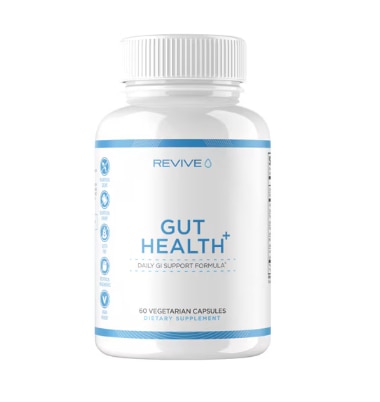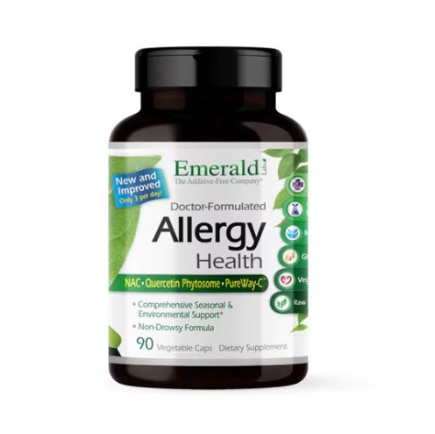Allergies, hay fever, allergic rhinitis…whatever you call it, the flu-like symptoms that appear every time pollen counts spike are no fun.
Although the symptoms are mostly respiratory, some research suggests that the root of your stuffy nose, watery eyes and nagging cough could be in your gut — or, more specifically, your gut microbiome.
What causes seasonal allergies?
Allergic reactions start when you inhale an allergen like pollen from grass, trees or ragweed. Pollen contains compounds that can activate your immune system and lead to inflammation. After your first exposure, your cells learn to recognize pollen and other allergens and create a type of antibody called immunoglobulin E (IgE).
The next time you inhale that pollen, IgE interacts with immune cells to trigger the release of compounds like histamine, which are involved in allergic reactions. So you can blame IgE the next time you start sneezing when your neighbor mows his lawn!
The role of gut health in immunity
IgE reactions are part of type 2 immunity, an immune response that helps your body identify and fight specific antigens—substances like pollen that come from outside your body. Imbalances in type 2 immunity may cause your immune system to overreact and trigger excess inflammation, leading to allergic reactions.
Your gut microbes help and support a more balanced type 2 immune response by regulating the activity of basophils, a type of white blood cell involved in allergic reactions. A healthy, balanced gut microbiome also supports the cells that create a barrier in your gut so the gut contents can’t pass into your bloodstream and cause inflammation elsewhere in your body.
What’s the connection between gut health and allergies?
The interactions between your gut and immune system may impact seasonal allergy symptoms by:
- Maintaining gut barrier health and integrity
- Promoting a balanced inflammatory response
- Increasing or decreasing histamine levels
- Influencing the nasal and lung microbiomes
Allergies, the gut barrier and leaky gut
The barrier lining your gut is made up of cells called epithelial cells that normally sit close together. But when you’re exposed to environmental factors like pollutants, pathogens or chemical food additives, the spaces — or junctions — between these epithelial cells can widen and cause your gut to become more permeable. The increased permeability, commonly known as “leaky gut,” is associated with symptoms like gas, bloating, diarrhea, indigestion and allergic reactions, particularly to food.
Beneficial bacteria in your gut may help support barrier health and moderate these symptoms. As these microbes break down fiber from food, they release compounds like short-chain fatty acids (SCFAs). SCFAs help epithelial cells produce energy. They may also promote the maturing of immune cells and a balanced immune response. An SCFA called butyrate appears to be particularly protective against seasonal allergies, possibly due to its balancing effect on type 2 immunity and IgE levels.
Other metabolites produced from vitamin A and the amino acid tryptophan may regulate your immune system and promote microbiome health, which is important for maintaining gut barrier function.
Histamine and the gut microbiome
An imbalanced gut microbiome may increase the levels of histamine in your body and aggravate seasonal allergy symptoms. Mast cells release histamine in response to allergens. Histamine then prompts you body to send blood and immune compounds to the affected area, causing inflammation and common allergy symptoms.
Certain groups of gut microbes are known to produce histamine, including Firmicutes, Clostridium, Bifidobacteriaceae, and Clostridiaceae. Some research shows that people with seasonal allergies have higher levels of microbes like Firmicutes in their guts but lower levels of SCFA-producing bacteria like Bacteroidetes and Proteobacteria. But Firmicutes can also produce the SCFA butyrate, so the lower levels found in some other studies could mean less butyrate to support gut health.
Overall, seasonal allergy symptoms seem connected to bacterial imbalances and lower bacterial diversity in the gut microbiota.
Beyond the gut: The nasal and lung microbiota
Your nose and lungs have their own microbiota that share some similarities with the gut microbiota. And, just like in your gut, an imbalance of microbes in your respiratory tract may be connected with seasonal allergies.
A 2022 study that looked at 110 people found that, compared to healthy people, the noses of people with seasonal allergies, asthma and a combination of both conditions had different proportions of bacteria like Prevotella, Feacalibacterium, Lactobacillus, Escherichia, Neisseria and Haemophilus. This suggests that the types of microbes in the nasal microbiota could be associated with inflammation and allergy symptoms.
Your lungs contain bacteria like Firmicutes, Bacteriodetes, Proteobacteria, Fusobacteria and Actinobacteria. When in balance, these microbes help protect against infection, regulate mucus production and promote a healthy lung barrier. Imbalances appear to be connected with respiratory conditions like seasonal allergies.
Some researchers hypothesize that immune reactions to antigens in your gut might affect the balance of microbes in your nose and lungs and trigger allergy symptoms. Having more SCFA producers in your gut may promote a healthier immune response to help keep inflammation and allergies in check.
Gut health and allergies: Tips for success
An approach that combines a high-fiber diet with lifestyle modifications can help boost SCFAs and support overall gut health.
Diet for allergies and gut health
Following a dietary pattern like the Mediterranean diet or the MAC diet gives SCFA-producing gut bacteria plenty of fiber from a diverse range of fresh, whole and minimally processed plant-based foods like vegetables, fruits, legumes and whole grains.
A mostly plant-based diet also contains other nutrients and compounds that may promote a balanced immune response. These include:
- Flavonoids, which may support gut barrier health, reduce swelling in the lining of the nost ad lungs, and regulate IgE levels and pro-inflammatory compounds called cytokines
- Unsaturated fats to replace pro-inflammatory saturated and animal fats, which are associated with seasonal allergies
- Vitamin E, which may help regulate IgE and histamine
- Other vitamins and minerals that may support immune health, such as vitamin A, vitamin D, zinc, and selenium
Living a lifestyle of gut health
Combining a high-fiber diet with these healthy lifestyle choices may offer additional benefits for gut health:
- Reduce stress to lower pro-inflammatory compounds, maintain immune cell levels, and promote a healthy gut barrier
- Improve sleep quality to promote healthy inflammatory responses and maintain gut barrier function
- Follow an exercise routine to support populations of SCFA-producing bacteria
- Control histamine with natural and over-the-counter remedies
- Modify the “exposome“ — the number of allergens, chemicals, and additives in your environment — to reduce the risk of inflammation and leaky gut
Probiotics for seasonal allergies
Some research shows that including probiotics in your gut health regimen could promote a healthier response to allergens:
- A 2022 review found that people who took probiotics instead of a placebo reported better regulation of seasonal allergy symptoms.†
- A 2021 review noted that strains of Lactobacillus and Bifidobacterium may promote butyrate production, support healthy levels of inflammatory markers, and regulate reactions to specific allergens like birch and alder pollen.†
- A 2024 trial found that combining probiotics with prebiotic fibers like those found in plant-based foods supported healthy levels of histamine-producing Firmicutes bacteria while promoting SCFA producers like Bifidobacterium and Lactobacillus.†
However, results from studies on probiotics for seasonal allergies are mixed. The potential effects may depend on the strain of probiotic, the type of allergen, and the amount of fiber available in the gut.
It’s okay to try a probiotic along with diet and lifestyle changes to see if it helps with your seasonal allergy symptoms. But if supporting gut health doesn’t work — or your symptoms get worse — it’s best to get allergy testing to pinpoint your allergies and start treatment for long-term relief.
†These statements have not been approved by the Food and Drug Administration. These products are not intended to diagnose, treat, cure or prevent disease.




